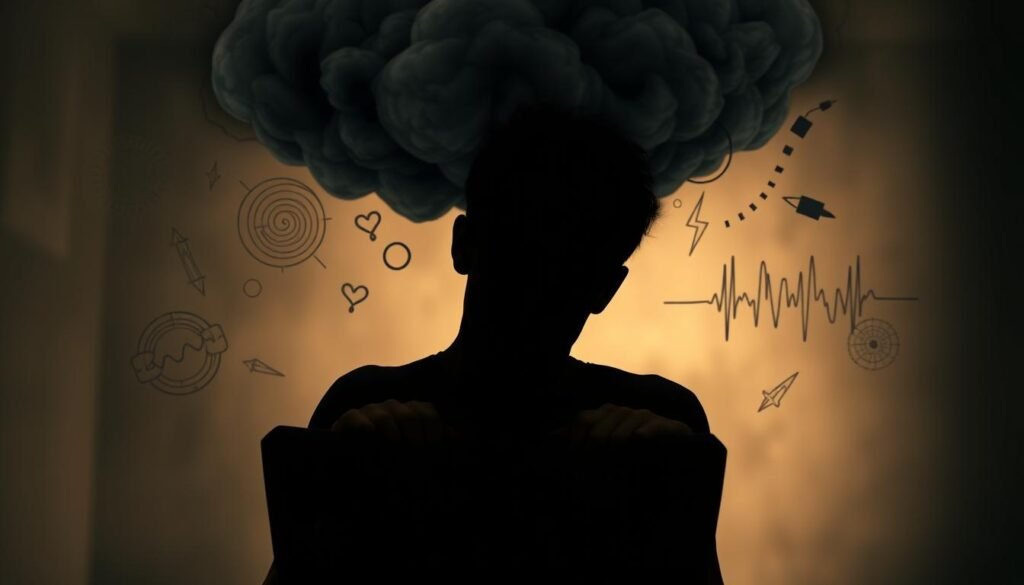Did you know that about 61.6% of people feel stressed or anxious at times? This fact shows just how common these feelings are. Stress mainly comes from outside pressures and can grow into serious anxiety if not handled. Many face life changes yearly that spike stress, turning it into anxiety.
Exploring the connections between stress and anxiety is key. This includes looking at anxiety sensitivity and how focusing too much on oneself plays a role. This article aims to share ways to manage stress and find coping methods effectively.
Key Takeaways
- 61.6% of individuals experience stress and anxiety in their lives.
- Chronic stress leads to anxiety disorders, impacting daily functioning.
- Stress triggers include moving, work pressures, and looming deadlines.
- Generalized anxiety disorder affects around 6.8% of the adult population.
- Cognitive-behavioral therapy is a common treatment for stress and anxiety disorders.
Understanding Stress and Anxiety
Stress and anxiety often trouble many people, impacting mental health. They seem similar but have their own unique features. This difference is crucial for handling them properly.
Definition of Stress
Stress comes from facing tough situations, like problems at work or changes in life. It triggers the fight or flight response. This makes the body produce hormones for dealing with threats.
Your heart beats faster, blood flows more freely, and you become more alert. These reactions are helpful for a while but can harm your health if stress lasts too long.
Definition of Anxiety
Anxiety feels like a constant worry that doesn’t go away easily. It doesn’t always need a specific reason to appear. People with anxiety often deal with nervous thoughts. This can cause a quick heartbeat and difficulty breathing.
Unlike stress, anxiety isn’t just a reaction to things happening around you. It can stick around and turn into a bigger problem, an anxiety disorder, if ignored.
Similarities and Differences between Stress and Anxiety
Stress and anxiety can make your heart beat faster and affect your breathing. They both can change your mood, make you feel alone, and lead to stomach problems. But they are not the same.
Stress pops up when facing challenges and fades away after. Anxiety, however, can linger without any clear trigger. Understanding this helps in managing them better.
How Stress Turns Into Anxiety
It’s crucial to know how stress can change into anxiety to keep your mind healthy. Stress sometimes grows into anxiety, especially when it becomes too much to handle. Being stressed for too long makes you more likely to get anxiety disorders.
The Link Between Stress and Anxiety
Stress and anxiety are closely linked. Stress usually comes from facing tough situations and goes away soon. But anxiety can stick around much longer. This is because of how our bodies react to stress hormones. If we don’t handle these reactions, they can turn into anxiety disorders. These disorders have symptoms that make everyday life hard.
Triggers for Transitioning from Stress to Anxiety
Many things can make stress change into anxiety. These include:
- Job loss or too much work
- Big life changes, like moving or divorce
- Worries about health or chronic illness
- Going through traumatic events
- Fighting with others, which can make anxiety worse
It’s vital to deal with these triggers to stop anxiety disorders before they start. Knowing what stresses you out can help you find better ways to cope. This makes you stronger against anxiety.
| Type of Trigger | Common Responses | Potential Long-term Effects |
|---|---|---|
| Job Loss | Fear, insecurity | Increased anxiety about finances |
| Health Issues | Worry, hopelessness | Conditions like GAD or depression |
| Traumatic Events | Anxiety, PTSD symptoms | Chronic stress and anxiety disorders |
| Relationship Challenges | Conflict avoidance, irritability | Social anxiety or isolation |
Handling stress well can prevent it from turning into anxiety. Knowing the triggers early lets people find good ways to cope. This leads to a healthier change from stress to anxiety.
Recognizing Symptoms of Stress
It’s important to recognize stress symptoms early. People might experience various physical symptoms and psychological symptoms. These can affect everyday life. Spotting these signs early leads to better stress management and prevents it from becoming anxiety.
Common Physical Symptoms of Stress
Stress often shows up physically in several ways, including:
- Headaches
- Muscle tension
- Dizziness
- Gastrointestinal issues
- High blood pressure
Such physical symptoms can disrupt work performance and personal connections.
Psychological Symptoms of Stress
Beyond the body, stress affects the mind too:
- Irritability
- Restlessness
- Feelings of overwhelm
- Persistent worry
Ignoring these signs can lead to worse issues like anxiety disorders. It’s crucial to understand stress and its potential harm. For more details, check out this source.
| Type of Symptom | Examples |
|---|---|
| Physical Symptoms | Headaches, muscle tension, gastrointestinal issues |
| Psychological Symptoms | Irritability, restlessness, persistent worry |
Identifying Symptoms of Anxiety
Anxiety shows up in different ways that affect how we live. It’s important to know these symptoms. This understanding helps us deal with anxiety better. It also guides us towards getting the right help.
Physical Symptoms of Anxiety
The physical signs of anxiety vary a lot. Here are some common ones:
- Rapid heartbeat
- Increased sweating
- Tingling or numbness in extremities
- Shortness of breath
- Muscle tension
- Chest pain
- Gastrointestinal issues
Knowing these signs helps people recognize their body’s reaction to stress.
Emotional and Psychological Reactions
Anxiety is not just about the physical. It deeply affects our emotions and thoughts. You might feel:
- A persistent sense of dread
- Apprehension about the future
- Irrational fears that disrupt daily life
- Feelings of isolation or detachment
These feelings can stop you from living your best life. So, managing anxiety is key to staying mentally healthy.
Distinguishing Anxiety Disorders
Knowing the exact type of anxiety disorder is crucial. Here are the main types:
| Anxiety Disorder | Description |
|---|---|
| Generalized Anxiety Disorder | Persistent and excessive worry about everyday things. |
| Panic Disorder | Repeated panic attacks filled with sudden fear. |
| Social Anxiety Disorder | Being scared and avoiding social instances due to fear of embarrassment. |
| Specific Phobias | Intense anxiety caused by certain objects or situations. |
| Agoraphobia | Staying away from places that might cause panic. |
| Substance-Induced Anxiety Disorder | Anxiety from using or stopping the use of substances. |
Anxiety disorders can come from health issues or personality traits. Understanding and identifying these disorders helps in managing them. This leads to a better life.

Common Triggers of Stress
It’s crucial to know what causes stress to manage it well. Moving to a new place, changing jobs, or losing someone special can be tough. These events can really wear you down mentally, causing worry.
Daily challenges, like close deadlines, family issues, and money troubles, add to the pressure. By understanding both life changes and everyday issues, you can create better ways to cope.
Life Changes and Circumstances
Big life changes are often stressful. They can make you feel really upset or unsure. Knowing that these changes are normal stress causes can help you handle them better and become stronger.
Daily Stressors and Their Impact
Everyday stressors are important for your well-being. Pressure from work, home duties, and busy schedules can overwhelm you. Over 70% of Americans say stress affects them physically and emotionally. Plus, 40% of workers say job stress affects them a lot.
By recognizing these pressures and changing your daily routine, you can deal with stress better. Helpful steps include therapy or learning about common stress triggers. These actions can improve your mental health.
Managing Stress Effectively
Managing stress well is key to keeping your mind healthy and happy. Learning different stress management techniques can really help you fight off anxiety. These methods include working out and practicing mindfulness, all to help you relax and live better.
Stress Management Techniques
It’s crucial to use a variety of techniques to handle stress properly. Doing activities like jogging, biking, or dancing for 2½ hours a week can cut down stress. Whether you prefer being alone or in a group, staying active is important. Setting realistic fitness goals helps a lot because being consistent is key, not being perfect. Plus, daily mindfulness meditation is great for dealing with stress, anxiety, and trouble sleeping. For more help, look at quick anxiety relief methods.
Importance of Self-Care Strategies
Self-care strategies are powerful for your mental health and fighting stress. Eating right, sleeping well, and relaxing activities boost your strength against stress. Knowing what makes you stressed, like work or personal issues, helps find the right self-care methods. Taking time to understand your feelings and actions makes managing stress easier.
Role of Exercise and Healthy Lifestyle Choices
Choosing a healthy lifestyle greatly affects how you manage stress. Eating well helps your body and mind work best. Plus, regular exercise improves your health, mental sharpness, and emotional well-being. Newcomers to exercise may need 4-8 weeks to get used to it. But, sticking with it brings more energy and a happier view of life.

Coping Mechanisms for Anxiety
Dealing with anxiety means using different ways to manage feelings. Mindfulness and cognitive-behavioral therapy (CBT) are very helpful. Having people who support us also helps us deal with tough times better.
Mindfulness Techniques
Mindfulness helps us live in the moment. It lets us watch our thoughts and feelings without judgment. This includes doing meditation, deep breathing, and yoga. These can really lower anxiety and make us feel peaceful and clear-minded.
Cognitive-Behavioral Therapy (CBT) Approaches
CBT is a proven way to face and change negative thoughts that cause anxiety. It helps us figure out what triggers our anxiety, change the way we think, and deal with tough situations better. Often participating in CBT can greatly treat anxiety disorders.
Support Systems and Professional Help
Having a support network is key in handling anxiety. Talking to friends, family, or pros can protect us from stress. Seeing a psychologist or therapist gives us strategies that meet our personal needs. This is crucial for navigating through anxiety’s challenges.
| Coping Mechanism | Description | Benefits |
|---|---|---|
| Mindfulness Techniques | Practices that focus on present moment awareness. | Reduces anxiety, enhances emotional regulation. |
| Cognitive-Behavioral Therapy (CBT) | A structured approach to challenge negative thought patterns. | Improves coping strategies and identifies triggers. |
| Support Systems | Networks of friends, family, and professionals. | Provides emotional support and practical advice. |
The Impact of Chronic Stress and Anxiety Disorders
Chronic stress harms both your body and mind. Knowing about chronic stress and anxiety disorders helps you take action early. It’s key to know when it’s time to get help from a pro.
Understanding Chronic Stress
Chronic stress comes from too much stress for too long. This constant stress messes up how your body works. It can cause big health problems.
Depression, heart issues, high blood pressure, and anxiety disorders can result. Who gets affected worst can depend on genes and past stress.
Identifying Anxiety Disorders
Anxiety disorders are when worry takes over your life. Signs include lots of fear, feeling edgy, and physical signs like a fast heartbeat or sweating. Knowing the difference between this and normal stress is key.
Without help, these disorders can disrupt your life. It’s important to spot them early on.
When to Seek Professional Help
Knowing when to seek help is crucial for dealing with chronic stress and anxiety. Signs you may need help include constant worry, struggling with everyday tasks, or stress-related physical symptoms. A mental health expert can offer ways to cope.

Strategies to Prevent Anxiety from Stress
It’s key to manage stress to stop anxiety before it starts. By knowing what makes our stress levels go up, we can do something about it. There are many ways to reduce stress and stop anxiety from happening.
Recognizing Your Triggers
Finding out what makes you stressed is the first step. This might be work stress, problems in relationships, or even lifestyle habits. Writing in a journal can help you spot these triggers and understand how they affect you. This knowledge helps you get ready and deal with stress better.
Implementing Coping Strategies
Using good coping methods can really cut down on stress and keep anxiety away. Mindfulness meditation is one technique that can lessen anxiety. Even jogging for 30 minutes a day can make a difference. And deep breathing exercises, like box breathing, can make you feel more relaxed.
Picking up hobbies, such as playing music or gardening, is great for reducing stress and adding happiness. Writing down things you’re thankful for improves mental health too. Good sleep routines and setting limits at work, especially in remote jobs, are crucial. Staying connected with others, by meeting up or just a call, builds a supportive network and eases anxiety.
If you need more help, Cognitive-Behavioral Therapy (CBT) is a good choice. It targets negative thoughts and gives you tools to handle stress better. For a detailed plan to beat stress and strengthen your mental health, check out this guide on stress relief: ways to relieve stress and anxiety.
Conclusion
Understanding stress and anxiety is key to better mental health. Stress comes in two forms: acute and chronic. Both can change how our bodies work and how we feel, often in negative ways. Learning what triggers stress and anxiety helps us handle them better. This can also keep anxiety disorders at bay.
The link between long-term stress and mental health problems like anxiety and depression is clear. To keep our minds healthy, we need to identify and tackle these issues early. Using good coping strategies and taking care of ourselves are parts of this. Supportive friends and family play a big role too. Knowing about stress and anxiety makes us better at coping. This leads to a happier life.
To stay both mentally and physically healthy, we need a well-rounded plan for dealing with stress and anxiety. Being aware and having the right tools can help us manage. This means we can bounce back better and enjoy our lives more.